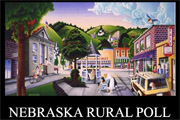Agricultural Economics, Department of

Nebraska Rural Poll
Date of this Version
2013
Document Type
Report
Citation
Nebraska Rural Poll, Research Report (September 2013) 13-3, 51 pages
Institute of Agriculture and Natural Resources, University of Nebraska-Lincoln
Also available at https://ruralpoll.unl.edu/pdf/13waterandclimate.pdf
Abstract
Many rural Nebraskans have experienced loss of wildlife and wildlife habitat, voluntary decrease in water usage, decreased farm production and wildfires to some extent as a result of last year’s drought. The majority of persons with occupations in agriculture have experienced decreased farm production and loss of business income as a result of last year’s drought.
Most rural Nebraskans rate indoor use in existing homes and agricultural uses (irrigation and livestock) as high priority uses of water. Uses of water that were not ranked very high include swimming pools for individual homes, watering golf courses and transferring water to other states. More rural Nebraskans rate use for livestock as a high priority this year as compared to 2004. Two items, indoor use in new housing developments and recreation (such as fishing and boating), show declines in the proportion rating them as a high priority when compared to 2004. Many rural Nebraskans are concerned a great deal about groundwater levels in Nebraska.
Most rural Nebraskans feel they understand global climate change issues fairly well or very well. And, most rural Nebraskans think global climate change is definitely happening or somewhat happening. However, rural Nebraskans are less likely to believe human activity is a significant cause of climate change this year than they were five years ago and are more likely to think current climate change is due to normal climate patterns. Furthermore, fewer rural Nebraskans this year believe that global climate change requires immediate action by the government as compared to five years ago.
Yet, most rural Nebraskans think change is required to solve global climate change. Most agree that “we will need to do something in my lifetime to deal with the adverse effects of global climate change.” And, one-half of rural Nebraskans are somewhat or very worried about global climate change.
Included in
Agribusiness Commons, Agricultural and Resource Economics Commons, Civic and Community Engagement Commons, Community-Based Research Commons, Demography, Population, and Ecology Commons, Entrepreneurial and Small Business Operations Commons, Place and Environment Commons, Public Affairs, Public Policy and Public Administration Commons, Regional Economics Commons, Rural Sociology Commons

